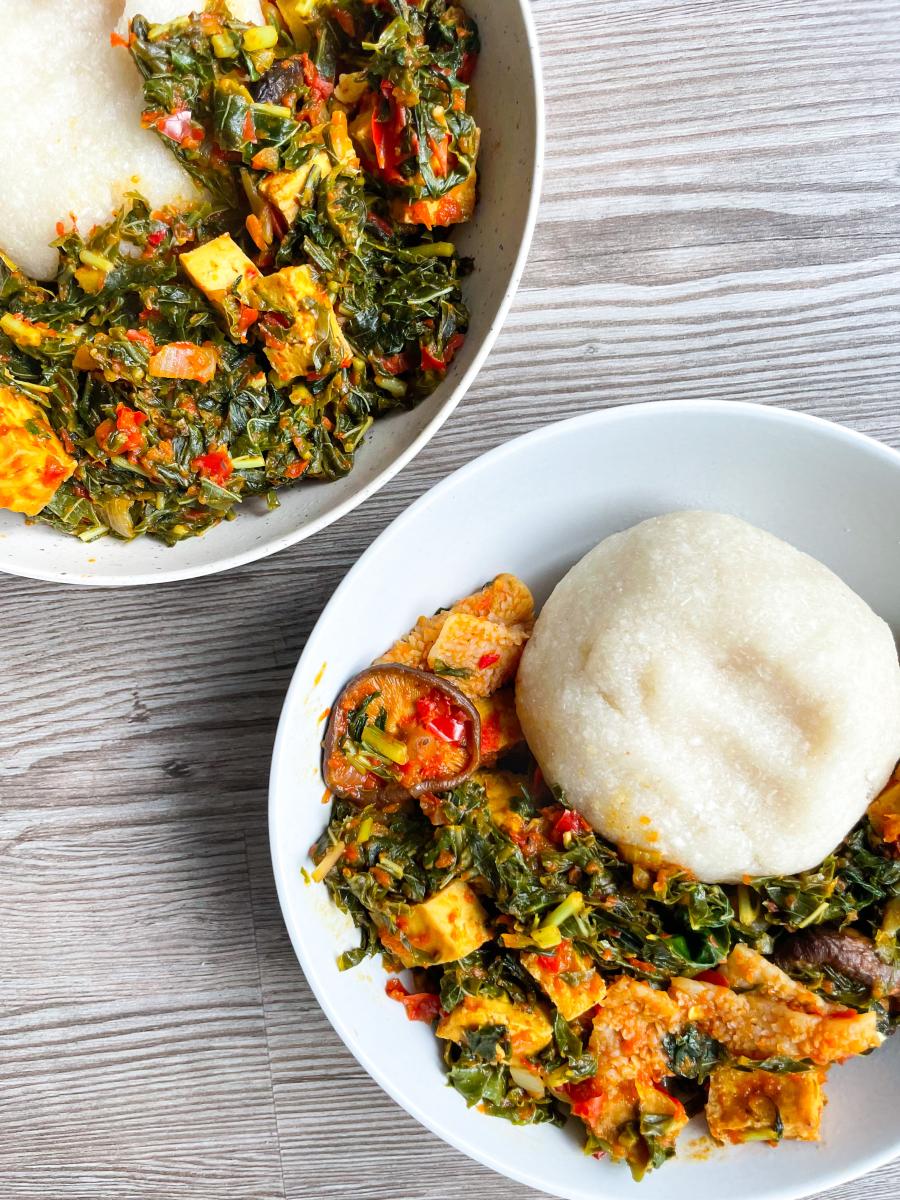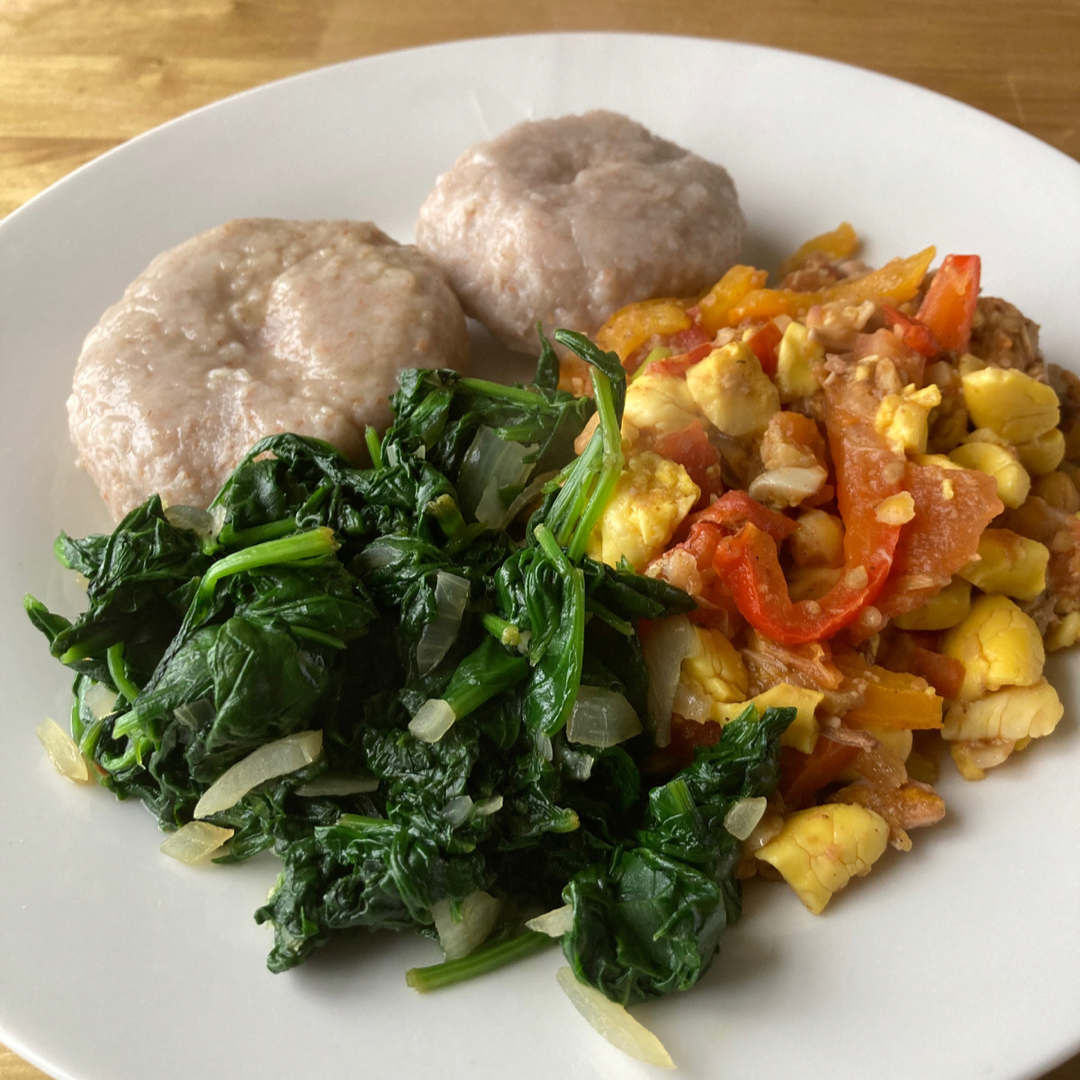Asha Swann explores how veganising dishes can link us to our heritage
Food is a celebration for Afia Amoako. Known online through her blog as The Canadian African and her Instagram as @eatwithafia, she’s spent several years trying to bring West African dishes into the mainstream food culture. Afia creates recipes authentic to her family’s roots in Ghana without compromising her vegan morals. 
Afia’s blog is all about making African dishes accessible, especially for people whose only experience of African food are meaty dishes like oxtail. While there are many cultural dishes that contain meat or dairy, Afia wants people to know that Africa is not a monolith: there are countless ethnic groups who pride themselves on creating flavourful dishes from indigenous ingredients. Afia spent many years between Ghana, Tanzania and South Africa, and her recipes represent a celebration of cultural ties across the continent. She’s ready to make vegan African dishes mainstream: a recognition that veganism isn’t just kale salads from Whole Foods – it’s a celebration of culture through food that has included meat-free ingredients such as beans, grains and spices for centuries.
“When I say mainstream, it's just an acknowledgement that there's cuisine from that part of the world that can be an option for everyone,” Afia says.
Balancing identities
With over 50 countries in the continent of Africa, it’s important to remember that each one comes with a different set of dishes, languages, customs and traditions that have established cultures spanning thousands of years.
One of Afia’s most popular recipes, a vegan Ghanaian palm nut soup, is just one example of a cultural dish that usually contains meat, but still tastes delicious with aromatic veggies and a rich selection of spices. Even though Afia’s vegan Ghanaian palm nut soup doesn’t contain beef or pork, she still created the recipe using celebrated West African ingredients, like dawa dawa, palm nut cream and prekese. The veganised soup also goes perfectly with fufu or omutuo, just like the traditional meat version. Afia says cultural dishes have a core identity: for some dishes, the core identity isn’t meat, it’s spices and flavourings.
But Afia isn’t the only one balancing her cultural identity with her vegan lifestyle. Chantal Tomlinson, a dietitian at The Vegan Society, is a Jamaican vegan who finds that authenticity in a dish comes from preparation and flavours. In Jamaica, where recipes like jerk chicken are exceptionally popular, the star of the dish isn’t necessarily the chicken itself, but rather the technique of all the favours melding together.
“Foods are often described as ‘jerk’ because a jerk rub or seasoning has been used, however in the truest sense, food described as ‘jerk’ has been slow cooked in a jerk pan,” Chantal explains.
Chantal focuses on using these spices and cooking methods whenever possible to ensure that the core identity of the dish is kept. She once veganised curried mutton, a dish commonly made with goat or lamb, by substituting animal products for a soy/mushroom equivalent.
“It was amazing!” she says. “I cooked it for vegans and non-vegans, and everyone loved it. One thing that really helped was that the texture of the meat-alternative was spot on.”
A symbol of unity
Both Afia and Chantal see their cultural dishes as a symbol of unity, bringing together people from all over the world.
“Food is a major part of any big occasion,” Chantal says. “Wherever people are gathered, there will be food.”
It was in Tanzania, where Afia lived for four years, that she really began to value the community that food creates. “There is a mix of both Bantu African communities with South Indian and Middle Eastern groups that have been there for thousands of years,” she says. “And you can see that through the food.”
Common Indian dishes like samosa and rice pilau have long been part of Tanzanian culture. Wali wa nazi, a fragrant rice dish made of coconut milk and salt, is exceptionally similar to nasi lemak, a staple dish in Malaysia. Dishes originally coming from the Middle East can also be found across Tanzania, where over 30 percent of the population is Muslim. During the holy month of Ramadan, a fast is broken every evening with a celebratory meal called iftar, where Middle Eastern dishes and traditional Tanzanian foods easily mingle. It was during her years in Tanzania that a teenage Afia began to realise just how much family traditions and cultural moments are created over a hot meal.
“I find that food truly provides the opportunity to tell African stories,” she says. “Together, sharing food has so much conversation opportunities to learn something new, and it makes eating fun and enjoyable and amazing.

Busting misconceptions
In the Caribbean, it’s common to make dishes using animal products around the holidays. But Chantal says that the idea that Jamaican food can’t be vegan-friendly is a misconception.
“Although Jamaican cuisine has many dishes where meat or fish are the main components, there are also many options that are naturally vegan,” she explains. “Some dishes can easily be made vegan by simply removing the meat component and others require some creativity in how the meat is replaced.”
Instead, Chantal focuses on the many plant-based Jamaican options like rice and peas, fried plantain, roast breadfruit, boiled and fried dumplings and steamed cabbage.
Meanwhile in West Africa, Afia explains that beans and grains are core components that can often be more accessible than animal products.
“Meat was seen as a form of luxury,” she says. “My mom grew up in a household where her mother and grandmother were not fans of animal-based proteins.”
Instead, Afia was raised on the belief that vegetables, beans, grains and spices are all incredibly versatile options to make authentic West African foods.
“When we were living in the village, all we got was greens and vegetables and look at us, we're still healthy and happy,” she says.
When it comes to fancy family meals like Easter Sunday, dishes in both Chantal and Afia’s family household have both meat and vegan options. With flavourful, veggie-filled renditions of classic recipes, both African and Caribbean culture is abundant in the way that Chantal and Afia create vegan cuisine.
This article was first published in our membership magazine The Vegan 2022 Issue 4.
Are you enjoying this blog? Then why not join The Vegan Society as a member! From just £2 per month, you will get access to our quarterly magazine, The Vegan, receive over 100 discounts, exclusive competitions and more! To become a member or find out more information, please visit our Join Now page.
The views expressed by our bloggers are not necessarily the views of The Vegan Society.

